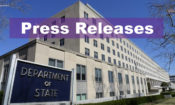Protection
71st Session of the UNHCR Executive Committee
U.S. Delegation Statement
As Delivered by Ambassador Andrew Bremberg
Wednesday, October 7, 2020
At the start, I want to thank many of you for your well wishes expressed on President Trump’s behalf, and I want to pass on our concerns and prayers for the High Commissioner for his speedy recovery.
As we mark 70 years since the establishment of UNHCR and 40 years since the enactment of the United States Refugee Act of 1980, the United States reflects on our longstanding support for UNHCR and remains committed to supporting UNHCR’s vital work to protect and secure solutions for refugees and other persons of concern. While record levels of forced displacement and the COVID-19 pandemic pose severe challenges to vulnerable populations, the United States remains committed to leading the world in humanitarian assistance.
This health emergency has indeed demonstrated the importance of international solidarity. The United States supports UNHCR’s efforts to ensure that the needs of refugees and others among the world’s most vulnerable are not overlooked as the international community responds to the pandemic. In the midst of this crisis, we commend the tremendous efforts and personal sacrifices of UNHCR staff and partners working to protect refugees, IDPs, and stateless persons.
We also applaud those States that are working to meet public health requirements while still respecting the principle of non-refoulement, and ensuring that refugees and other persons of concern are included in national COVID-19 response and recovery efforts. In countries like Thailand and Jordan, we have seen governments incorporate refugees into COVID-19 planning and response with the support of UNHCR, NGOs, and international donors. These partnerships demonstrate how the international community can work with hosting States to find sustainable responses for refugees that benefit them and host communities.
We applaud countries that have improved their national asylum systems over the past year, including Argentina, Brazil, Mexico, Paraguay, and Uruguay. The United States appreciates UNHCR’s critical role in ensuring that international protection standards are met, as well as supporting States’ efforts to build asylum capacity and find durable solutions, including: supporting repatriation and monitoring conditions of return, such as for Burundian refugees, supporting local integration, and using resettlement as a protection tool.
One year on, we commend UNHCR’s updated policy on internal displacement, which reaffirms its commitment to decisive and predictable engagement with IDPs worldwide. This enhanced approach is timely, given the urgent needs of a growing number of IDPs forced from their homes by conflict, such as in Burkina Faso. Similarly, the United States welcomes the work of the High-Level Panel on Internal Displacement, including the extension of its mandate. As a political proponent of this process and a donor, we want to ensure that the Panel generates actionable and innovative recommendations to improve protection and solutions for IDPs. Further, the United States continues to support UNHCR’s leadership of three IDP clusters, particularly the Global Protection Cluster.
The United States remains committed to combatting violence, particularly against women and girls, as an integral part of every humanitarian response. Through many domestic and international initiatives, our aim remains to reduce the incidence of violence against women and girls, improve the ways international organizations and NGOs respond, and increase accountability at the global level. We are pleased that our continued support has enhanced UNHCR’s capacity to prioritize and respond, particularly now with a troubling spike in violence against women and girls since the onset of the pandemic. These efforts have increased the timeliness, effectiveness and efficiency of UNHCR’s violence prevention activities.
Finally, as we are now more than halfway into the ambitious ten-year I Belong Campaign to end statelessness, I urge Member States to continue to meet their commitments to resolve existing situations of statelessness and to prevent new ones from arising. We are particularly encouraged by steps taken by States such as Latvia, Cote d’Ivoire, and Kazakhstan, to reform their nationality laws, policies, and procedures. We continue to make progress on our own pledges to advocate for the prevention and reduction of statelessness, to provide U.S. humanitarian assistance through UNHCR to help protect stateless persons, and to champion the goal of achieving nationality law reforms in the 25 countries that do not allow women to confer citizenship on their children on an equal basis with men. We can get to zero stateless persons globally, but only if Member States take bold steps.
Mr. Chairman, in closing, with growing humanitarian needs and more than one percent of humanity forcibly displaced, let us re-commit ourselves – Member States and UNHCR alike – to broadening and strengthening the protections for individuals and families forced to flee conflict and persecution. The United States remains resolute in our commitment to the most vulnerable among us and calls on our partners to shoulder their share of the responsibility to ensure that protection and solutions – even amidst these difficult times – are achievable.
Thank you.
















